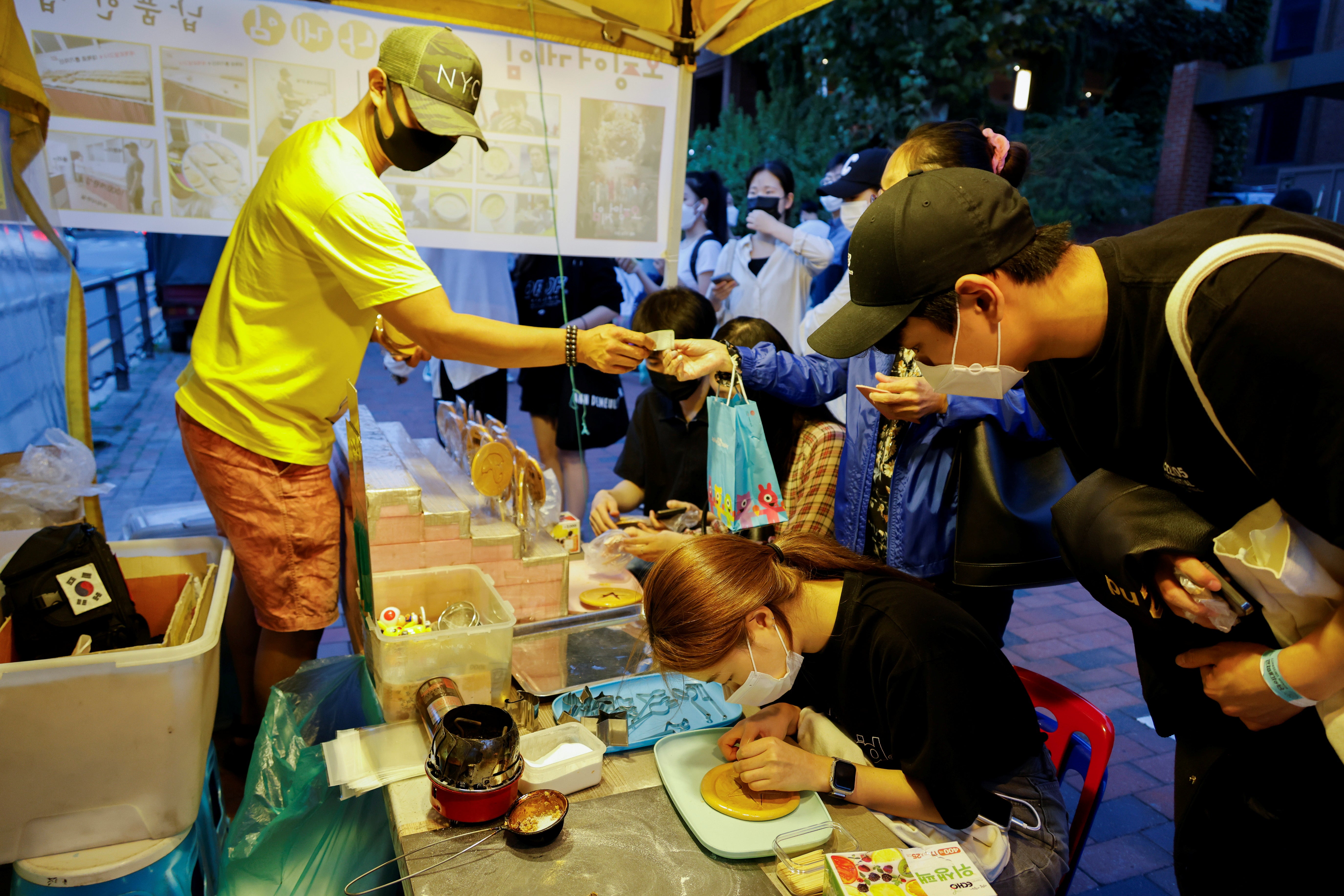Squid Game: South Korean confectioner basks in fame of ‘sweet and deadly’ treat which stars in Netflix hit
Business booming for street vendor whose brittle candy stars in Netflix hit

Your support helps us to tell the story
From reproductive rights to climate change to Big Tech, The Independent is on the ground when the story is developing. Whether it's investigating the financials of Elon Musk's pro-Trump PAC or producing our latest documentary, 'The A Word', which shines a light on the American women fighting for reproductive rights, we know how important it is to parse out the facts from the messaging.
At such a critical moment in US history, we need reporters on the ground. Your donation allows us to keep sending journalists to speak to both sides of the story.
The Independent is trusted by Americans across the entire political spectrum. And unlike many other quality news outlets, we choose not to lock Americans out of our reporting and analysis with paywalls. We believe quality journalism should be available to everyone, paid for by those who can afford it.
Your support makes all the difference.A South Korean sweet featured as one of the lethal challenges in the Netflix hit TV drama Squid Game has become a global craze, boosting business for the candy seller who provided the confection for the show.
The series has become a viral hit by depicting childhood games with deadly consequences. One of the challenges has the cash-strapped contestants on the show carving out the symbol etched into a brittle sugar candy called dalgona without cracking the whole piece or risk being shot by masked enforcers.
Dalgona is typically sold with a variety of shapes but Squid Game featured four, a triangle, circle, star, and an umbrella. One piece is about 2,000 won (£1.25) but you can get a buy-one, get-one-free deal if you don't crack the first one.
An Yong-hui, 37, has been making dalgona for the past eight years in a university district in the capital Seoul. He and his co-workers used 15 kg (33 lb) of sugar to make 700 candies for the filming in June 2020 of the show's third episode, which is described by Netflix as equal parts "sweet and deadly".
As the show's popularity has surged since its premiere last month, Mr An hasn't been able to go home for a week in order to meet the demand from eager Squid Game fans that start queuing up outside his 2-square-metre (2.4 square yards) street kitchen at 11am.
He now sells more than 500 dalgonas a day, from less than 200 before the show's premiere.
"We are thinking we should place a rifle here as well," Mr An said, chuckling at his reference to the show's outsized repercussions for failure.
On the show, the downtrodden contestants vie for a prize of 45.6 billion won (£28.30) by competing in games that recall a more idyllic pre-digital time.
Netflix said in an article on the show's creation that director Hwang Dong-hyuk's selection of childhood games was deliberate to make the show more relatable to the audience.
For South Koreans, dalgona sellers were a fixture in front of schools until the early 2000s but the trend has died down since then and, according to Mr An, the candy is even older.
"I have heard so much about the dalgona challenge from my dad and grandma and was always curious," said Lee You-hee, a first-year university student in Seoul.
"It was my first time trying and was shocked at how easily it breaks," she said, after failing the challenge while standing near Mr An's stand.
In line with the show's viral explosion, international viewers are posting their efforts at making dalgona and passing the challenge on video-sharing platform TikTok and other social media.
Even e-commerce marketplaces such as Amazon, eBay and Coupang are selling dalgona cooking kits and tools for as much as $29.99.
In Singapore, the Brown Butter Cafe was the latest business to tap the Squid Game hype and the drama of the dalgona challenge.
Sitting with brows furrowed and an intense look of concentration, Squid Game fan Wang Chen, 32, picked away unsuccessfully at his delicate dalgona candy.
His failure on Friday would have meant certain death in Squid Game. But in the Brown Butter Cafe, it just means missing out on a prize.
"I almost made it ... if you're so strict as in the real TV show, then I'm gone," Mr Wang said.
Mr Wang looked over at friend Zhang Qi's attempt.
"This is a disaster. She might have been dead in the first minute," he said.
Reuters
Join our commenting forum
Join thought-provoking conversations, follow other Independent readers and see their replies
Comments